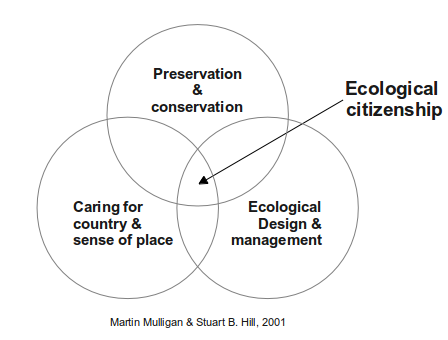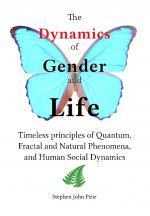[Reprinted with permission, 28 April, 2011]
From: “ECOLOGICAL PIONEERS: A SOCIAL HISTORY OF AUSTRALIAN ECOLOGICAL THOUGHT AND ACTION” (by Martin Mulligan & Stuart B. Hill, 2001, Cambridge University Press, Melbourne, VIC); pp. 304-5.
In looking for complementarity between diverse traditions we must remain conscious of the consequences of our dualistic Western legacy of human “mastery” over, and simultaneous separation from, nature. The exploration of the overlaps of various traditions may lead to some new, emergent insights and the following diagram suggests a way of integrating different approaches to engagement with the land around the notion of “ecological citizenship”:

As strategies for changing dominant social attitudes and practices the three approaches all have some strengths and weaknesses, as suggested in the following table:
Strengths |
Weaknesses |
|
Preservation &
|
Fosters respect for nature. Recognition of non-utilitarian rights of other species and the need to maintain their habitats. |
Fosters a separation of people and nature and leaves the “weaker” category of nature in a vulnerable position. Only slows down the rate of loss of biodiversity. |
Caring for country & a sense of place |
Deep integration with the ‘other’; leading to paradoxical insights into practical caring. |
Dependent on a high level of local knowledge and engagement, and a ‘spiritual’ attitude to nature, which is lacking in most of the population. |
Ecological design & management |
Maximally uses scientific knowledge and practical experience to understand and work with nature. |
Too limited by quantifiable data and ‘proof’; thereby neglecting much intuitive ‘ecological wisdom’. Can sustain the illusion that humans are in control. |
If we acknowledge that all three traditions have both strengths and weaknesses we may be more inclined to draw the best ideas from each. Unfortunately, each of the traditions has often been defended with such zeal as to give rise to territorial wars between these potentially complementary “ecological worldviews”.
A more rewarding, if more difficult, task is to seek an integration of their diverse ecological insights. Perhaps the notion of “ecological citizenship” can facilitate such integration [e.g., by enabling young people to engage with nature, from these and other perspectives, in mutually supportive ways].
| Attachment | Size |
|---|---|
| 0 bytes |
 "The Dynamics of Gender and Life" ebook is now available at
"The Dynamics of Gender and Life" ebook is now available at